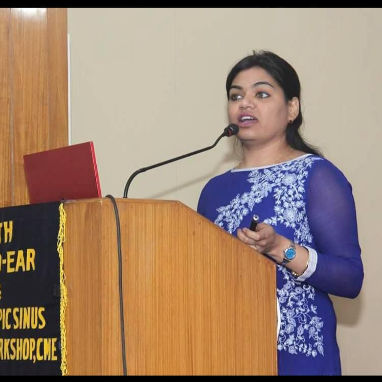Sinusitis; Types and Causes
Learn about sinusitis, including its types, causes, symptoms, and treatments. Understand how to prevent sinus infections with lifestyle changes for relief.

Written by
Last updated on 3rd Jul, 2025
Sinusitis, or a sinus infection, happens when the tissues inside the sinuses get inflamed. This can be a result of allergies, bacteria, or viruses, making tissues all red and swollen. Sinuses are hollow cavities in the bones of the face that normally help keep the nose moist and protect it against infections. Sinusitis is something a lot of people suffer from all year round. Sometimes, it clears up in a couple of weeks, and it is called acute sinusitis. But other times, it lasts longer, and that's when it's chronic. Chronic sinusitis can disturb one’s day-to-day life, making it tough to breathe and get a good night's sleep.
Anatomy of the Sinuses
Sinuses are air spaces (cavities) in the face and skull bones that play a crucial role in respiratory functions. It also helps with the body’s defence against foreign elements and voice resonance.
There are four pairs of sinuses, and they are located in different areas of the skull –
Maxillary (in the cheekbones, next to the nose)
Frontal (up in the forehead, just above the eyes)
Ethmoid (between the eyes and the bridge of the nose)
Sphenoid (behind the nose and between the eyes)
Types of Sinusitis
Here are the major types of sinusitis –
Acute Sinusitis
Acute sinusitis lasts less than four weeks. Symptoms include a painful face, a blocked nose that refuses to clear, and mucus buildup. Treatment includes decongestants, saline washes, and pain relief.
Chronic Sinusitis
This is a form of sinusitis that lasts for 12 weeks or more. Besides infection, other leading causes of this condition are allergies or structural issues like nasal polyps or a crooked septum. Symptoms of this sinusitis are a blocked nose, facial pain, thick mucus, and difficulty smelling. Chronic cases need more attention, such as medications and possibly surgery.
Recurrent Sinusitis
It is a recurring form of sinus infection. It happens when the sinuses get inflamed repeatedly because of ongoing or recurring infections, allergies, or even just a weak immune system. The patient might feel unwell and have a harder time getting better.
Allergic Sinusitis
Allergic sinusitis is different since it is caused by allergies. Pollen, dust, or pet hair can swell the insides of the nose and sinuses. This kind of sinusitis has the same symptoms as other sinus infections, like a blocked nose, sneezing, and mucus dripping.
Common Causes of Sinusitis
Sinusitis is often triggered by bacteria that set up an infection. Some usual suspects are bacteria like Streptococcus pneumoniae and Haemophilus influenza. Someone suffering from the condition might feel a lot of pressure or pain in their face. Even their sense of smell can go away. Usually, the doctor will prescribe antibiotics to tackle this.
On the other hand, viruses are often the culprits for acute sinusitis, like the common cold. The insides of the nose can get all red and puffy and block the usual mucus drainage. This leads to buildup and causes pain and discomfort in the face. This kind of sinus clears up on its own in a few days to a week and does not require antibiotics to fight it off.
Fungal infections are least likely to cause sinusitis. However, they can be a major concern when someone has a compromised immune system or spends time on a farm or in areas with a lot of moulds. To cure this, one might need antifungal medication, but in some cases, surgery is required.
Allergies and Environmental Triggers
Allergies are a big cause of sinusitis. When things like pollen, dust mites, or pet dander cause an allergic reaction in the nose, the mucous membranes swell. This swelling can block the sinuses and trigger mucus buildup, leading to a stuffy nose and pain. Allergic rhinitis can happen simultaneously with sinusitis, making symptoms worse and infections more likely to come back.
The environment one lives in can significantly affect sinus health. Dryness, pollution, and rapid weather changes can irritate nasal passages, making them prone to swelling and infection. Being in places with a lot of pollen, dust, and mould can cause sinus problems. So, keeping the surroundings clean and humid helps limit exposure to these irritants and prevents sinusitis.
Anatomical Factors
Nasal polyps are lumps that can grow in the nasal lining and sinuses. They often result from inflammation or allergies and block the sinuses' drainage routes. This leads to pressure and pain and a higher risk of infection. Treatments for nasal polyps include nasal steroid sprays, medicines, or sometimes surgery for larger ones.
When the wall between the nostrils is not in the right place, it leads to a deviated septum. This comes in the way of sinus drainage, as it narrows the openings. The mucus buildup then leads to infection. Surgery might be needed to fix the blockage or to improve sinus health.
Symptoms of Sinusitis
The common symptoms of sinusitis are the following –
Nasal congestion
Facial pain
Headache
Postnasal drip
Cough
Reduced or lost sense of smell and taste
Fatigue
It is important to note that the intensity of the symptoms will change based on the type of sinusitis and its severity.
Acute and chronic sinusitis share some basic differences –
| Acute Sinusitis | Chronic Sinusitis |
Symptoms last less than four weeks and often develop quickly. Usually caused by viral infections, though bacterial infections can occur. More likely to cause fever, intense facial pain, and thick nasal discharge (often yellow or green). Symptoms resolve with treatment or on their own once the infection clears. | Symptoms persist for 12 weeks or more, often with recurring episodes. More commonly linked to allergies, nasal polyps, or structural issues rather than infections. Less likely to cause fever but leads to persistent congestion, postnasal drip, and facial pressure. A reduced sense of smell and prolonged fatigue are more prominent symptoms than in acute cases. |
Consult Top ENT Specialists
Diagnosis of Sinusitis
When diagnosing sinusitis, the doctor will ask about the symptoms like a blocked nose, face pain, etc., and how long one has been suffering from it. He/she will then examine the nasal passages for swelling or blockage. The doctor might also check for tenderness around the nose and forehead.
To get a clearer and more detailed evaluation of the condition, the physician may also ask the patient to take a CT scan or MRI. These imaging tests give a better look at the condition, helping doctors establish it and decide the course of treatment.
Treatment Options for Sinusitis
In terms of treatment, the physician's first approach is to suggest some over-the-counter pills like decongestants, pain relievers, and antihistamines. But, if the sinus is bacterial and sticks around for more than 10 days or starts to get worse, he/she might prescribe antibiotics.
If the sinuses act up more regularly, surgery might be considered. One option is endoscopic sinus surgery, and another is balloon sinuplasty. Surgery can help with chronic cases by improving airflow and easing symptoms.
Prevention of Sinusitis
Drinking enough water is important to prevent sinusitis. Keeping the nose clean and not smoking also helps. A device called a humidifier can stop the nose from getting too dry. Getting rest, eating clean, and managing stress can also keep the body's defences strong against infections.
It is also advised to limit exposure to allergens like pollen, dust, and mould. Keeping the home clean can help manage other conditions, such as allergies, asthma, and persistent runny nose.
Conclusion
Sinusitis is a common yet troublesome condition that affects daily life. Understanding its causes, symptoms, and treatments helps in managing it effectively. Practising preventive measures like hydration, hygiene, and avoiding allergens can reduce occurrences. Also, seeking medical advice for persistent cases ensures proper treatment and relief, improving overall respiratory health and long-term well-being.
Consult Top ENT Specialists
Consult Top ENT Specialists

Dr. Gurleen Kaur
Ent Specialist
14 Years • MBBS ,MS -ENT
New Delhi
Apollo 24|7 Clinic - Delhi, New Delhi
Dr. Anila Vishwanath
Ent Specialist
17 Years • MBBS,MS (Oto-Rhino-larynology)
Bengaluru
Hospitec multi-speciality hospital, Bengaluru

Dr. Nitin Mittal
Ent Specialist
8 Years • MBBS, MS (ENT)
Kolkata
HOLISTIC ENT AND DENTAL SUPERSPECIALITY CLINIC, Kolkata

Dr. Baisakhi Bakat
Ent Specialist
13 Years • MBBS, DNB (Oto-Rhino-Laryngology)
Kolkata
Genesis, Kolkata

Dr. Meenakshi Venugopalan
Ent Specialist
14 Years • MBBS, DLO Otorhinolaryngology
Bengaluru
Shree Manyata Hospitals, Bengaluru